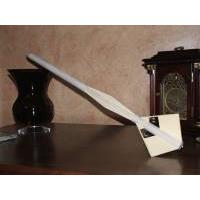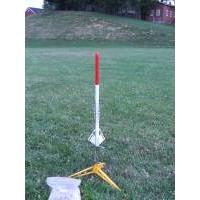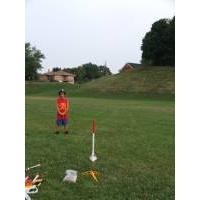Estes Solar Sailer II
Estes - Solar Sailer II {Kit} (2044) [1991-1993]
Contributed by Bill Eichelberger
| Construction Rating: | starstarstarstarstar_border |
| Flight Rating: | starstarstarstarstar |
| Overall Rating: | starstarstarstarstar_border |
| Published: | 2011-05-15 |
| Length: | 28.50 inches |
| Manufacturer: | Estes  |
| Skill Level: | 3 |
| Style: | Futuristic/Exotic |
 Brief
Brief
Having been a fan of the original Solar Sailer back in 1978, I felt fortunate to pick up the reproduction Solar Sailer II in 2001 after being the (shocked) only bidder in an Ebay auction. Although about ten inches shorter than the original, the Solar Sailer II looked identical everywhere but side by side with its big brother.
Components
- 18" BT-20 core tube
- 12.7" BT-50L front tube
- 6.5" BT-50FE
- BNC-50J nose cone
- wooden dowel
- 4 CR-2050 centering rings
- 18mm engine hook
- 2 launch lugs
- Mylar parachute
- balsa fin stock
Construction
While technically not a 3FNC rocket, the Solar Sailer II builds much like one, thanks to two different sets of fins that are offset from each other on the body tube. Actually the foremost set of fins are considered "gussets", and fit into the area on top of the BT-20 motor tube that connected the front and back sections of BT-50. The rearmost fins are constructed from two balsa fins connected by a dowel, an effective method that works on both practical and cosmetic levels. One nice thing that this kit has going for it over other similar kits that use this kind of design, like the Starlab, is a BT-50 tube up front that allows extra room to pack the parachute over the BT-20.
Finishing
I've always had a weakness for red and white rockets and for rockets that finish easily. This one falls into both categories. I filled the tube spirals on the exposed section of BT-20 with thinned Fill N Finish before assembly. This part would have been more difficult if I'd waited until after assembly because of the recessed area that I'd have to fit the sandpaper into. Once the final assembly was finished, the rocket was sprayed with two coats of Valspar white primer with sanding after each coat. Valspar Cherry Red gloss was sprayed on the forward section of the rocket, then masked off after drying for the gloss white coats. There was a problem with the decals, which were old and didn't age well. They splintered in some cases, tore in others, and just plain failed to adhere in a couple. Disappointing, but since they were all black they would have been a simple printing project had the rocket lived to see additional flights.
Flight
Due to circumstances beyond my control, namely the trees and an ill-timed breeze, the Solar Sailer II had a brief two-flight career. The first flight took place four years after the Ebay auction, on a seemingly calm, warm July evening at B6-4 Field. First flight and ninth of the night was on, SURPRISE, a B6-4. In the twilight the flame from the B6-4 was clearly visible throughout the flight, something I really hadn't seen since my brother in law Tony and I had staged a night launch on the field several years earlier. The rocket tipped over perfectly at apogee and recovered near the edge of the field. The next rocket to fly was an MPC Nike Patriot and the breezes had picked up noticeably by the time it flew. It barely, BARELY missed being treed on its maiden flight, which should have been a hint to me to pack up and call a ten flight night a success. I didn't. The sister of two of my recovery crew members (and one of my Brownies from my troop co-leader days,) arrived late and wanted to see a flight, so I flew an Estes Big Dawg into a tree for her. For what happened next I have no explanation.
I decided to give the Solar Sailer II another shot instead of just calling the night a success and taking it home to print some new decals for it. Another B6-4 flight, this one even cooler to watch than the first because of the advancing darkness. All was fine at first and the recovery looked like it would be at the edge of the field near the spot where the first flight had landed, but a rogue breeze kicked up and carried it into the tree just feet from the Excelsior Goonybird Zero. To make matters worse, we moved into the neighborhood behind the field later that summer, and for the rest of the summer, fall and winter, I had to see the fruits of my labors dangling in the trees.
 Flight Rating: 5
Flight Rating: 5
Summary
Pro: Classic lines of the Solar Sailer in a more compact package. Impressive performance that doesn't overfly a small field.
Con: Launch fever cost me a good looking bird.
 |
 |
Flights
 |
 |
Sponsored Ads
 |
 |
















C Graski (June 21, 2011)
I've lost a total of four rockets for the sake of satisfying one of younger observers. To me, it's worth it, because it's something that they won't forget and will be a source of positive memories as they grow older.